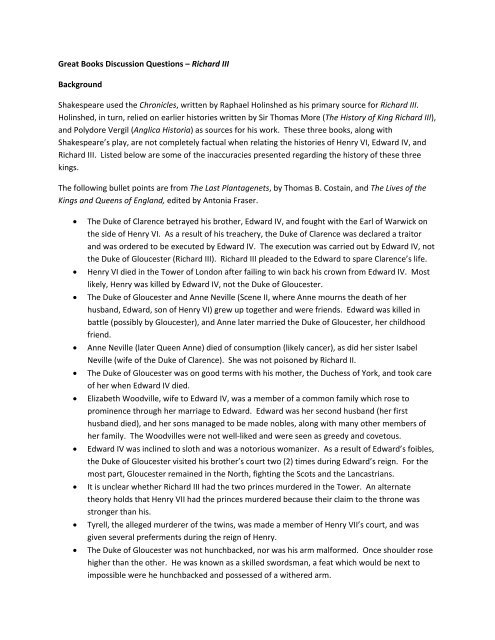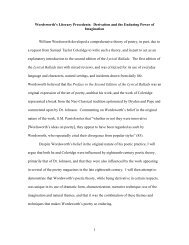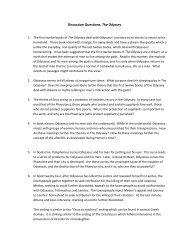Great Books Discussion Questions – Richard III ... - Peter Ponzio
Great Books Discussion Questions – Richard III ... - Peter Ponzio
Great Books Discussion Questions – Richard III ... - Peter Ponzio
Create successful ePaper yourself
Turn your PDF publications into a flip-book with our unique Google optimized e-Paper software.
<strong>Great</strong> <strong>Books</strong> <strong>Discussion</strong> <strong>Questions</strong> <strong>–</strong> <strong>Richard</strong> <strong>III</strong><br />
Background<br />
Shakespeare used the Chronicles, written by Raphael Holinshed as his primary source for <strong>Richard</strong> <strong>III</strong>.<br />
Holinshed, in turn, relied on earlier histories written by Sir Thomas More (The History of King <strong>Richard</strong> <strong>III</strong>),<br />
and Polydore Vergil (Anglica Historia) as sources for his work. These three books, along with<br />
Shakespeare’s play, are not completely factual when relating the histories of Henry VI, Edward IV, and<br />
<strong>Richard</strong> <strong>III</strong>. Listed below are some of the inaccuracies presented regarding the history of these three<br />
kings.<br />
The following bullet points are from The Last Plantagenets, by Thomas B. Costain, and The Lives of the<br />
Kings and Queens of England, edited by Antonia Fraser.<br />
The Duke of Clarence betrayed his brother, Edward IV, and fought with the Earl of Warwick on<br />
the side of Henry VI. As a result of his treachery, the Duke of Clarence was declared a traitor<br />
and was ordered to be executed by Edward IV. The execution was carried out by Edward IV, not<br />
the Duke of Gloucester (<strong>Richard</strong> <strong>III</strong>). <strong>Richard</strong> <strong>III</strong> pleaded to the Edward to spare Clarence’s life.<br />
Henry VI died in the Tower of London after failing to win back his crown from Edward IV. Most<br />
likely, Henry was killed by Edward IV, not the Duke of Gloucester.<br />
The Duke of Gloucester and Anne Neville (Scene II, where Anne mourns the death of her<br />
husband, Edward, son of Henry VI) grew up together and were friends. Edward was killed in<br />
battle (possibly by Gloucester), and Anne later married the Duke of Gloucester, her childhood<br />
friend.<br />
Anne Neville (later Queen Anne) died of consumption (likely cancer), as did her sister Isabel<br />
Neville (wife of the Duke of Clarence). She was not poisoned by <strong>Richard</strong> II.<br />
The Duke of Gloucester was on good terms with his mother, the Duchess of York, and took care<br />
of her when Edward IV died.<br />
Elizabeth Woodville, wife to Edward IV, was a member of a common family which rose to<br />
prominence through her marriage to Edward. Edward was her second husband (her first<br />
husband died), and her sons managed to be made nobles, along with many other members of<br />
her family. The Woodvilles were not well‐liked and were seen as greedy and covetous.<br />
Edward IV was inclined to sloth and was a notorious womanizer. As a result of Edward’s foibles,<br />
the Duke of Gloucester visited his brother’s court two (2) times during Edward’s reign. For the<br />
most part, Gloucester remained in the North, fighting the Scots and the Lancastrians.<br />
It is unclear whether <strong>Richard</strong> <strong>III</strong> had the two princes murdered in the Tower. An alternate<br />
theory holds that Henry VII had the princes murdered because their claim to the throne was<br />
stronger than his.<br />
Tyrell, the alleged murderer of the twins, was made a member of Henry VII’s court, and was<br />
given several preferments during the reign of Henry.<br />
The Duke of Gloucester was not hunchbacked, nor was his arm malformed. Once shoulder rose<br />
higher than the other. He was known as a skilled swordsman, a feat which would be next to<br />
impossible were he hunchbacked and possessed of a withered arm.
Henry VII was the first of the Tudors to hold the throne. Elizabeth I was a member of the Tudor<br />
dynasty.<br />
<strong>Questions</strong>:<br />
1. Why does Shakespeare portray <strong>Richard</strong> as being misshapen and deformed? Edward IV was<br />
tall, blond and handsome. <strong>Richard</strong> was shorter and dark‐haired. Is Shakespeare’s portrait<br />
of <strong>Richard</strong> intended to show that <strong>Richard</strong>’s bearing was not regal? Should looks enter into a<br />
discussion of whether a person is suited to rule?<br />
2. Shakespeare has <strong>Richard</strong> kill Clarence and Edward, son of Henry VI. He also has Gloucester<br />
poison his wife Anne, plot against Edward IV, and attempt to marry Elizabeth his niece.<br />
What reasons does Shakespeare have for portraying <strong>Richard</strong> in this manner?<br />
3. The marriage of Elizabeth of York with Henry VII (of Lancaster) puts an end to the War of the<br />
Roses, since these warring factions are now joined in marriage. Does Shakespeare see this<br />
union as a good result? Does he view Henry VII favorably since the war has come to a close?<br />
4. Did Shakespeare follow his sources literally? How much of the play do you believe was well‐<br />
intentioned propaganda to support the Tudors?<br />
5. Why does Shakespeare present Clarence as a well‐meaning, but clueless, nobleman? How<br />
much of the portrayal of Clarence is based on fact, and how much of the portrayal meant to<br />
establish Clarence as good, and <strong>Richard</strong> as evil?<br />
6. The War of the Roses produced several disputed kingships. Shakespeare and his<br />
contemporaries were disturbed that the “natural order of things” was upset by these<br />
frequent changes in their ruler. Does Shakespeare attempt to portray <strong>Richard</strong> as being<br />
unnatural? If so, how?<br />
7. Do you think that Shakespeare blames <strong>Richard</strong> for prolonging the War of the Roses, and<br />
upsetting “the natural order of things”? Why or why not?<br />
8. Has <strong>Richard</strong> been unfairly accused of being a bad king and a bad man?




